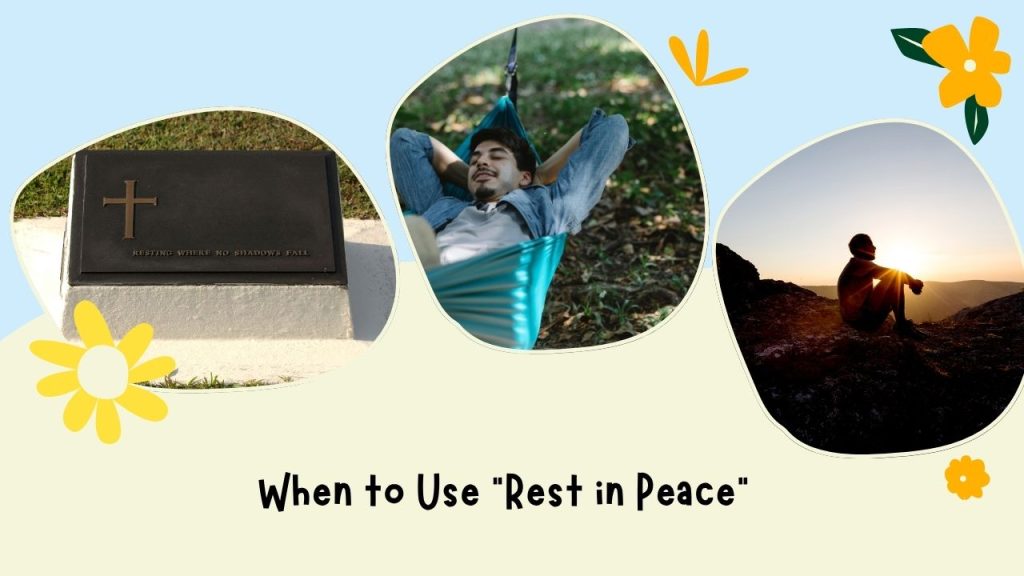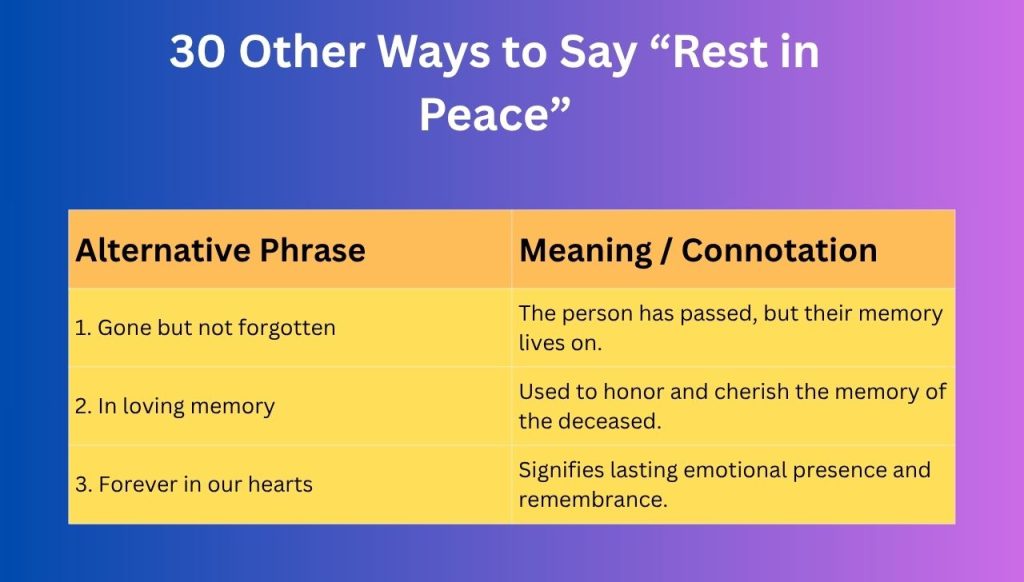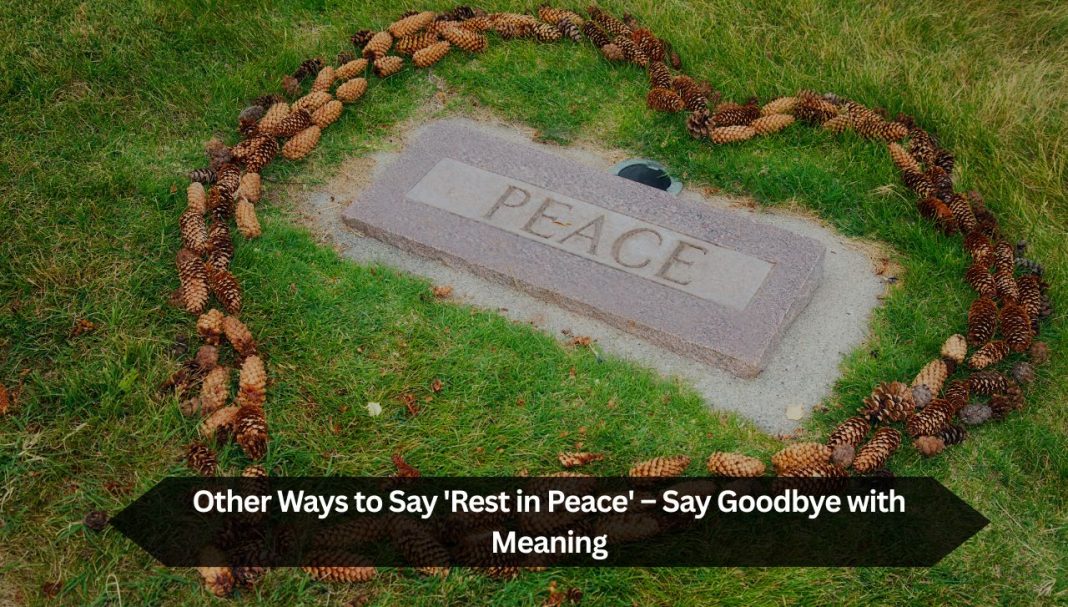Losing someone you care about is never easy. The pain comes in waves, and sometimes words feel too small for the grief you’re carrying. Still, we say something. It’s our way of honoring the life that’s passed and comforting those left behind.
“Rest in Peace” is the go-to phrase. It’s solemn. It’s respectful. It’s short enough for a text but heavy enough to carry meaning. But let’s be honest—it can also feel a little overused. Sometimes, you want to say something more personal. Or maybe the situation calls for different words—something softer, more spiritual, or even less religious.
“Rest in Peace” Meaning
The phrase “Rest in Peace” comes from the Latin Requiescat in Pace. Originally used on Christian gravestones, it was a prayer—an earnest hope that the soul of the dead would find eternal peace in the afterlife. Over time, it became common language. You’ll hear it in eulogies, see it in obituaries, and read it on social media posts when someone passes away.
But here’s the thing: it’s not always tied to religion anymore. These days, “Rest in Peace” is a catch-all. Whether you’re religious, spiritual, or neither, it’s become a kind of shorthand for, “You mattered. I hope you’re at peace now.” Still, depending on the context—or your relationship with the person—it might not feel like enough.
Dive Deeper : 30 Other Ways to Say “Please Be Advised” (With Meaning, When & Why to Use It)

When to Use “Rest in Peace”
“Rest in Peace” fits a lot of situations. You might use it:
- In a condolence message
- In a eulogy or memorial speech
- On a sympathy card
- On social media
- During a moment of silence or reflection
But even though it’s appropriate in many places, it doesn’t always feel right. If the person was deeply spiritual, you may want something with more depth. If they were light-hearted, maybe you want something less formal. Or maybe you’re writing a card and want to stand out—to write something that doesn’t sound like it was pulled from a template.
Why Say “Rest in Peace”
We say “Rest in Peace” for two reasons—closure and comfort. It offers closure by marking a life’s end with something meaningful. It’s a final send-off. A way of saying, “You’ve done your part. You can rest now.”
And it offers comfort—to us, the living. Saying something respectful allows us to process the loss. To name it. To mourn it. But the truth is, different words might do that better for different people. Let’s look at some alternatives that hit the same emotional note, each in their own way.

30 Other Ways to Say “Rest in Peace”
| Alternative Phrase | Meaning / Connotation |
|---|---|
| 1. Gone but not forgotten | The person has passed, but their memory lives on. |
| 2. In loving memory | Used to honor and cherish the memory of the deceased. |
| 3. Forever in our hearts | Signifies lasting emotional presence and remembrance. |
| 4. May their soul find peace | A prayer for the deceased’s spiritual tranquility. |
| 5. At peace | Indicates the end of suffering or turmoil. |
| 6. In God’s care | Expresses faith that the person is with a higher power. |
| 7. Rest easy | A more informal, gentle version of “Rest in Peace.” |
| 8. Safe in His arms | Religious phrase meaning the deceased is protected by God. |
| 9. Enter into eternal rest | A formal or religious expression of peaceful afterlife. |
| 10. Gone to a better place | Suggests that the deceased has moved on to a peaceful or divine realm. |
| 11. Sleeping with the angels | Poetic, often used for children or in gentle speech. |
| 12. May their memory be a blessing | Common in Jewish tradition, honoring the life lived. |
| 13. Ascended to the heavens | Implies the soul has risen to heaven. |
| 14. Called home | Suggests God has brought the person to their eternal home. |
| 15. Journeyed beyond | A poetic way to say someone has passed away. |
| 16. Returned to the earth | Reflects a natural or spiritual return to the elements. |
| 17. Crossed over | Often used to refer to transition to the afterlife. |
| 18. With the ancestors | Suggests a reunion with past generations. |
| 19. Resting in the arms of the Lord | Christian phrase denoting divine comfort. |
| 20. Found eternal peace | Indicates lasting peace in the afterlife. |
| 21. In eternal slumber | A poetic way of referring to death as sleep. |
| 22. With the stars | Evokes a cosmic or spiritual resting place. |
| 23. Reunited with loved ones | Suggests joining family or friends who have passed. |
| 24. Passed into grace | A spiritual expression of peaceful transition. |
| 25. Gone to eternal rest | Formal phrasing similar to “Rest in Peace.” |
| 26. Laid to rest | Refers to burial and peaceful conclusion. |
| 27. Slipped away peacefully | Suggests a calm, gentle passing. |
| 28. Departed this life | A respectful, formal way to say someone died. |
| 29. Taken too soon | Expresses sorrow, especially for a young or unexpected death. |
| 30. Flew with the angels | Poetic phrase suggesting a heavenly ascent. |
Dive Deeper : 30 Other Ways to Say “Enjoy Your Weekend” (And When to Use Them)
Conclusion
The words we choose after someone passes don’t have to be grand. But they should be honest. Whether you’re speaking at a funeral, posting on social media, or comforting a friend—how you say goodbye matters. “Rest in Peace” is a good phrase. It’s simple and respectful. But if you’re looking for words that feel more personal, or that better match the person you’re remembering, there’s no shortage of options.
Use whatever feels right. And if that means breaking tradition a little to speak from the heart—do it. Because at the end of the day, it’s not about the exact words. It’s about saying, “You mattered.” And that’s something worth saying well.

Grammar Nerd, ESL Trainer, Low-Key Comma Crusader
Daniel has taught English for over a decade, from small community classes in Oaxaca to bustling university halls in London. He has a knack for turning even the driest grammar points into relatable, real-life language tools—think fewer red pens, more real talk. He co-founded Grammation to make grammar less gatekeeper-y and more global. When he’s not decoding sentence structures, he’s probably hiking with a paperback novel or adding unnecessary hyphens for fun.
“The rules of grammar should empower people—not trip them up.”


